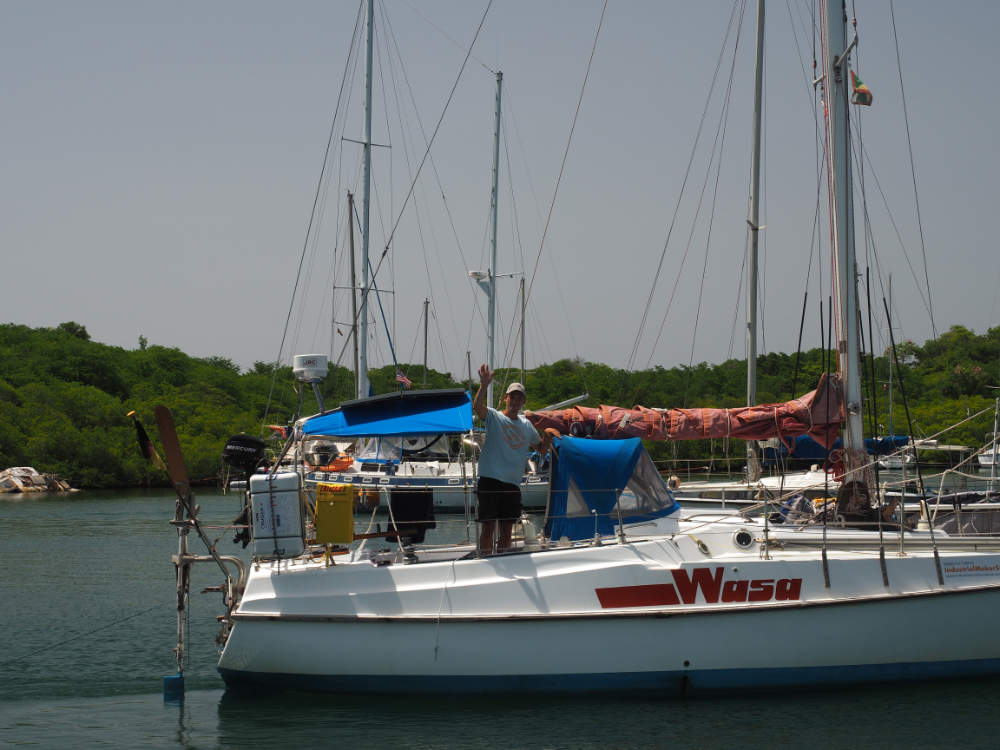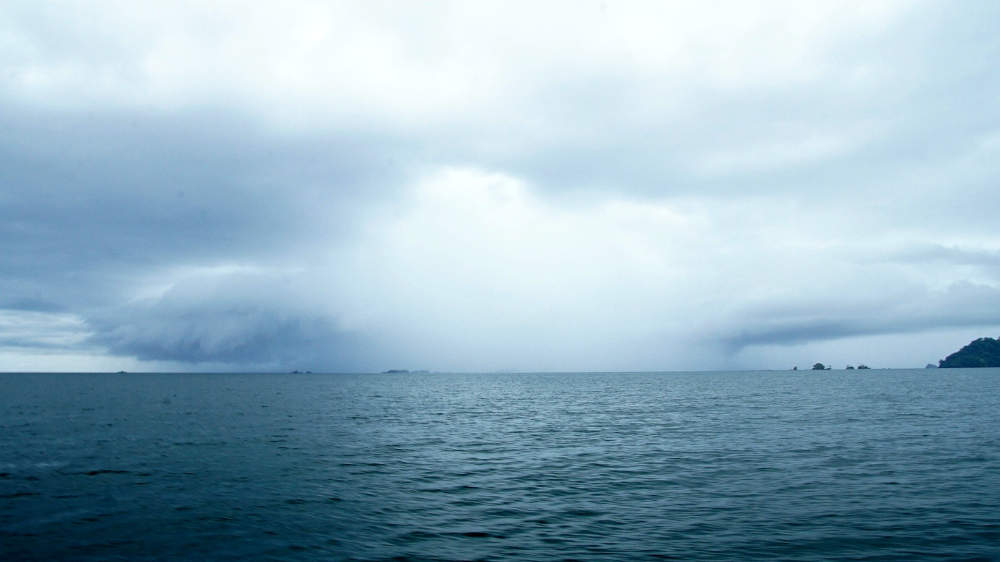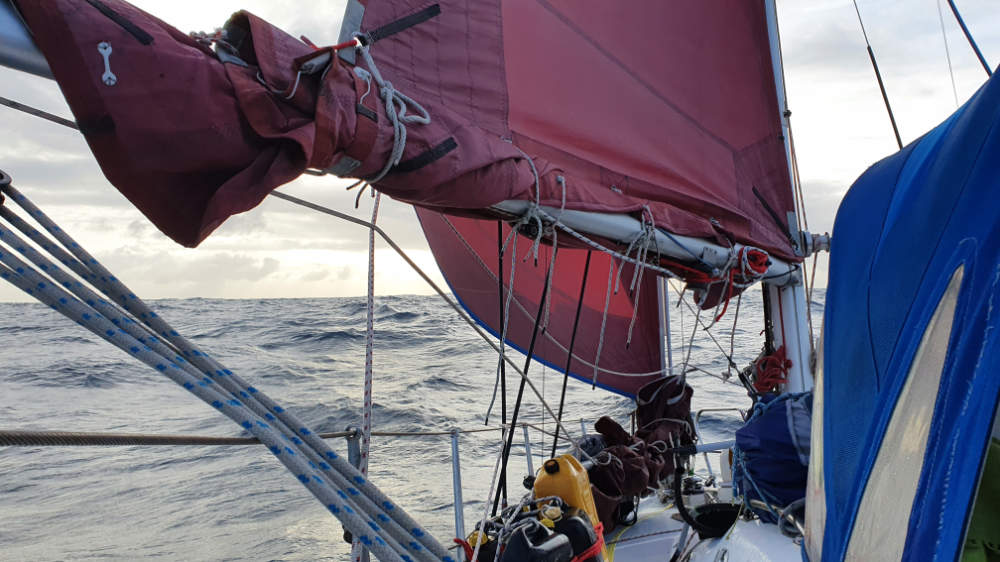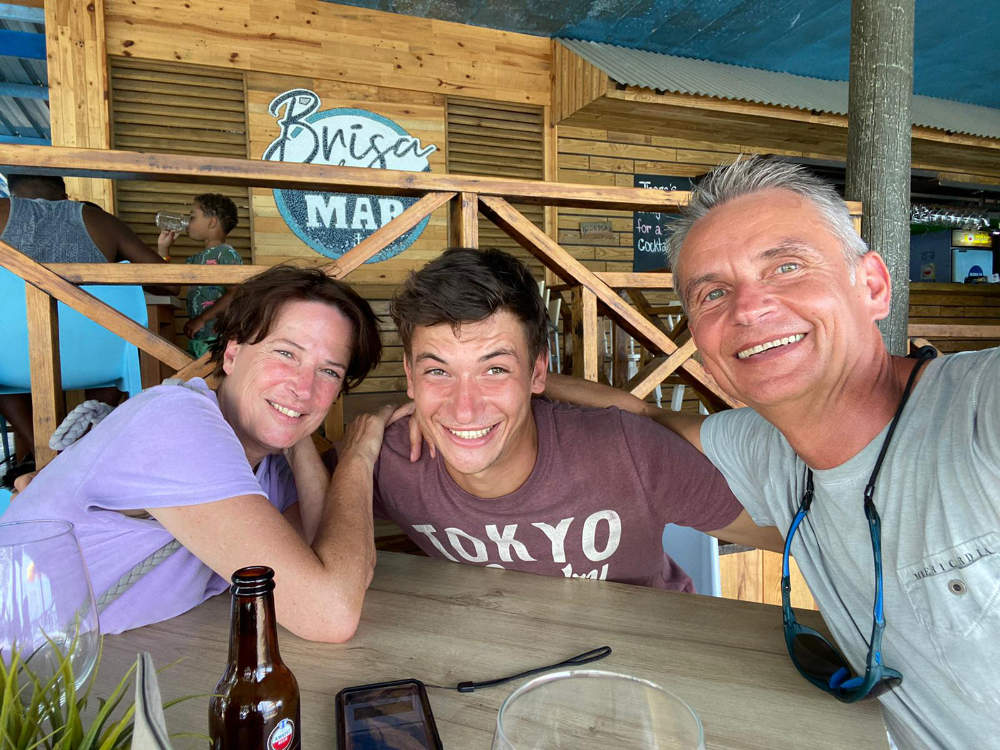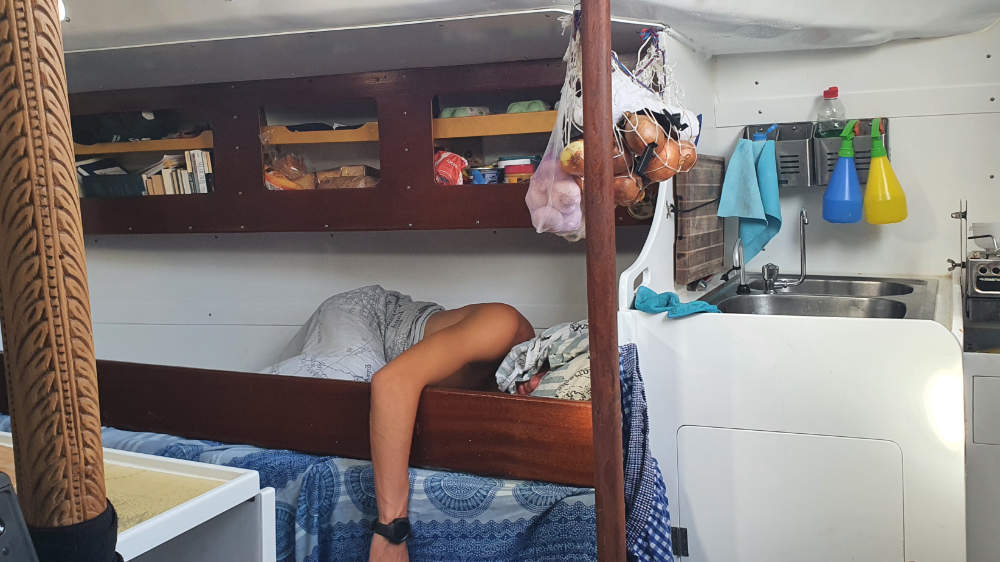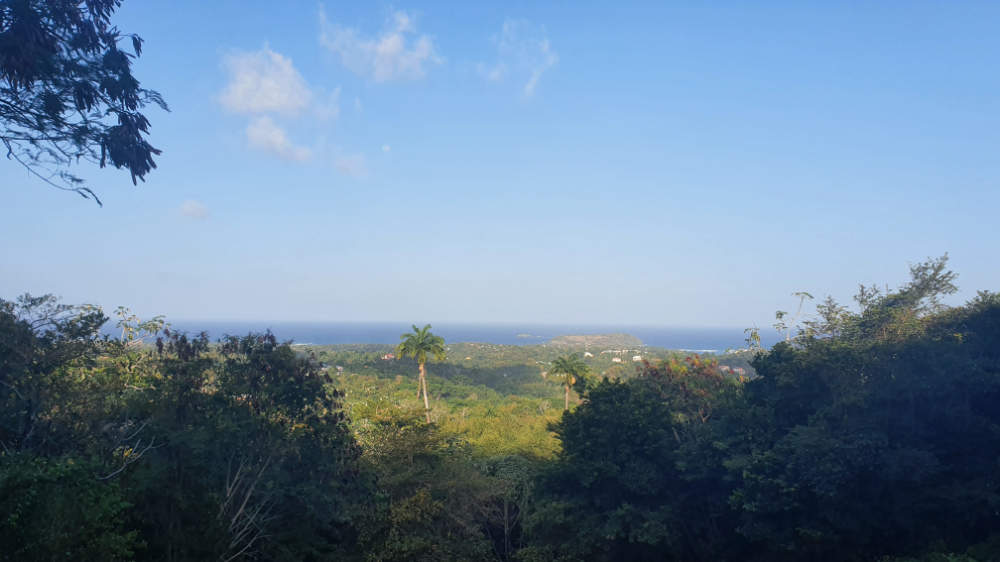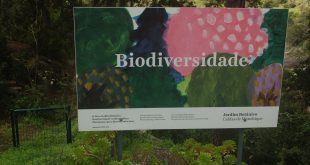Saturday 30th October 2021.
Who determines our future? ECO123 accompanies interesting people on their journeys and puts their ideas up for discussion. Round-the-world sailor Boris Herrmann starts his book on the Vendeé Globe with a realisation: „Sailing is not a sport. Sailing is adventure, getting to know yourself better, experiencing the wonders of nature.“ The protagonist of ECO123 ‘s Saturday story is 23-year young Paul Piendl from the Ammersee lake area in Germany who buys a 45-year old sailing yacht in Portugal, hauls it out of the water and painstakingly restores it over the course of many months in a shipyard in Lagos, Algarve during the Corona pandemic. Paul is a boat builder by trade. On 31 December 2020 the big day arrives, he looks back onto the shore, says „Adeus“ to the Lagos marina and begins his sailing trip around the world, in the company of his friends Moritz and Leon. The destination of that first stretch are the Canary Islands. From there the Passat trade wind will take them across the Atlantic all the way to Panama. The plan is for the passage through the Canal to bring the old sailing yacht WASA to Costa Rica. There, Paul wants to prepare the Pacific and the South Sea crossings while looking for a job in boatbuilding. The next destinations are French Polynesia and Australia. This week Paul Piendl writes in ECO123…
The time spent with Leon and Moritz is slowly coming to an end. Both are planning to go ashore and strike out on their own. Before returning to Germany to start his university degree, Moritz is feeling the pull of Dominica. Leon will be backpacking for two months in Panama before starting a one-year stint of volunteering with a permaculture project in Ecuador.
We want to make it together all the way to the Caribbean! It’s already late March and Surinam, Guiana, Trinidad and Tobago are still keeping their borders closed. We are preparing for a five-day crossing, to sail directly to Grenada without a stopover. On the morning of 27 March the big moment has arrived. I am waiting at the Corona testing centre before they even open to pick up the required tests for entering Grenada. Then we have lift-off. While we are leaving the first sea miles in our wake, I praise the day for its perfect conditions.
Three days later I write in my diary: „This is the first time that I’m able to write anything down during this crossing. The past few days have been a disaster! And they are already blending into a porridge of memories: on the evening of departure we reefed the sails on noticing a storm front on the horizon. Unfortunately the wind did not calm down again, and for a full two days we were fighting against a 40-knot winds. During gusts the display showed over 50 knots. I felt sick and the other two were not much better. […] We were sailing with the large sail with the third reef and a small foresail on the second forestay. Probably it would have been better to have used the storm foresail, but we didn’t have the strength left to change the sails. Everything is wet, the waves are constantly crashing across the deck, flooding the cockpit. Whoever is on duty is lying on the floor in front of the companionway, dressed in oilskins and a life jacket, to check things every 20 minutes and to optimise the sailing position. Two out of three times he returns under deck soaked to the bone.“
The storm abates only gradually. When the waves finally smooth down, we head directly for Grenada and reach our destination two days later.
Another Covid test and five days of quarantine later we finally receive the long-awaited stamp in our passport. I stay a full three months on the island. Fees for more Covid tests take the shine out of the idea of visiting neighbouring islands. However, I start enjoying staying longer in one place, to start feeling at home. I get to know many people, deal with necessary jobs on the boat and explore „Spice Island“ on many little day tours. In the last weeks of my stay I build a walkable roof above the cockpit of the catamaran of a couple who are friends of mine.
The time comes to move on. My visa is running out in less than a week and I’d like to meet my parents on Curaçao island. This will be my first solo trip! From the start I wanted to know what that’s like: „a man and his boat“ (Rollo Gephard). This stretch is perfect to find out. I am counting on four days at sea.
In the end it turns out I have to prove my mettle a bit earlier. On the way to the clearance port in St George the bilge pump suddenly starts sucking water out of the boat. An urgent and anxious search reveals that the engine is spewing out water!
It’s a leakage in the cooling system. A weld seam has burst on the exhaust manifold; there’s hot water spewing everywhere. Luckily this only happens as long as the engine is running and the water pump is working.
So I sail the last four miles without the support of the engine and to the amazement of some onlookers am crossing under sail through the narrow harbour entrance. The wind has completely died down and I allow the sails to stay up while I move backboard into the box. Stupid idea. As in that exact same moment a new gust arrives, and I have to thank the valiant intervention of a female sailing friend of mine that I’m able to go ashore without a scratch on the bow.
The news of my broken engine and delayed departure spreads quickly. Everybody comes together to help me out! Rodger picks me up and drives me to the dockyard. The leaking manifold exhaust that I’ve dismantled is being handed around and people try to think how it might be repaired. In the end I am handed a near-complete reconstruction. It’s a true gift. I fit it back in again and after a last game of volleyball I set sail once more.
Meanwhile my parents are longing for my arrival in Curaçao and waving to me from the shore of the narrow entrance called „Spanish Saters“. Me too I’m delirious with the desire to see them again. We’ve not met since my departure from Portugal, haven’t seen each other since, and were planning the reunion on the island.
Still, here too I have to prove my health status and wait in quarantine for three days before I can finally hug my mum and dad. They move onto my boat for the remainder of the time. We live, sail and cook together and it’s interesting for them to experience for themselves how my life works, being so different from their own. My mum has to laugh when I point out to her that even spoons have their dedicated place and to please not just throw them into the drawer. „Suddenly, the guy can do tidiness!“
Then I find a job on a motorboat. The idea is I’ll help out for three weeks. We take tourists to an uninhabited offshore island, Curaçao in miniature. The tourists spend a day on the beach and in the water, while the crew and I are looking after them, feed them, lead snorkelling safaris and hand out rum punch on the way home. When I come home from my first day at work I notice I can’t smell or taste anything! Indeed the test the next morning confirms my suspicion: I have Covid! – luckily with only very mild symptoms, but the next ten days I am back in quarantine on the boat. I’ll only work four times until my departure.
From Curação, a day’s journey sailing against the wind takes us back into the diving paradise of Bonair. Jannika, the friend who’d saved me from the quay wall in Grenada, has just passed her diving instructor exam. I’m more than happy to make myself available as her first student and guinea pig!
We dive on a near-daily basis straight from the boat, into the crystal-clear, colourful world full of hills, valleys, abysses and corals that I’ve never seen before. We see turtles, rays, eels, parrot fish, frogfish, in all colours of the rainbow. The list is endless – it’s just brilliant!
From Curação, a day’s journey sailing against the wind takes us back into the diving paradise of Bonair. Jannika, the friend who’d saved me from the quay wall in Grenada, has just passed her diving instructor exam. I’m more than happy to make myself available as her first student and guinea pig!
We dive on a near-daily basis straight from the boat, into the crystal-clear, colourful world full of hills, valleys, abysses and corals that I’ve never seen before. We see turtles, rays, eels, parrot fish, frogfish, in all colours of the rainbow. The list is endless – it’s just brilliant!
In Panama, the gateway to the Pacific, Sofie leaves and I meet up with my friend Sofien. We met at the boat-building school in Germany and I’ve talked him into joining me to work at a dockyard in Costa Rica. „Sailcargo“ is in the north of Costa Rica, near the town of Puntaverales. As the name suggests they are building a sailing cargo ship. More specifically, by late 2022 they want to build a three-mast freight sailboat, near 150 feet long, 26 feet wide. The company’s plan is to transport goods in a sustainable and environmentally-friendly way along the American west coast. The idea of sustainability starts with the building process, using mainly local hardwoods. The crew live together near the shipyard and supply themselves to a large degree with produce grown by themselves, locally. In order to keep up with modern standards and guidelines, the „Ceiba“ flagship combines tradition with state-of-the-art technology. Two electric engines allow manoeuvring in narrow harbours and while under sail double up as hydrogenerators. In combination with additional regenerative loading technology the ship is supposed to be able to provide its navigational instruments, lighting, etc., with autonomously generated power. The project is incredibly inspiring, and I am also attracted to it by the sheer size which I’m not used to from my apprenticeship on the lakeshore. (www.sailcargo.org, Youtube & Instagram: Sailcargo)
Yet, things don’t always go according to plan.
„I’m now repairing my Genua sail for the third time. However, when hoisting the sail I already spot a new hole. It’s the edges which have borne the brunt of the UV light and the saltwater. The material is brittle. Without a professional repair at the sail maker’s things aren’t looking good for the red fabric. After various repairs my dinghy is leaking and has reached the end of its useful life really. I also notice that my rudder is still squeaking and I remember that the WASA needs a new coat of „Antifouling“ paint, as well as a new laminate at the main bulkhead in the hull. The Panama canal gobbles up all my savings, and alongside food and board, from „Sailcargo“ we receive only a small amount of pocket money which will never cover all my costs for the Pacific passage. I am asking myself, „What will happen now?“, „How am I supposed to pay this?“ and „Where can I earn some money to pay for all those repairs on my boat? I am looking for solutions, which are difficult to find when you’re over 400 sea miles from the shore. Doubts start to raise their ugly heads…“
In a ZOOM chat with ECO123 Paul Piendl tells us about his problems with the good ole funds. He is worried and at the same time thinking about how he can earn enough over the coming months to stock up with enough food because the Pacific will be the longest stretch, supposed to bring him from March 2022 onwards from Costa Rica via Tahiti all the way to Australia. For several months he’ll be at sea with no shore leave and will need all his skills and all his strength to steer the little sailing yacht, under ten feet long – all the while taking care to not rack up much damage to boat parts on this trip. Next week Saturday, from eight in the morning onwards you can read how Paul intends to solve his problems, in issue no. 113 at www.eco123.info, the online edition of ECO123.
 Eco123 Revista da Economia e Ecologia
Eco123 Revista da Economia e Ecologia

